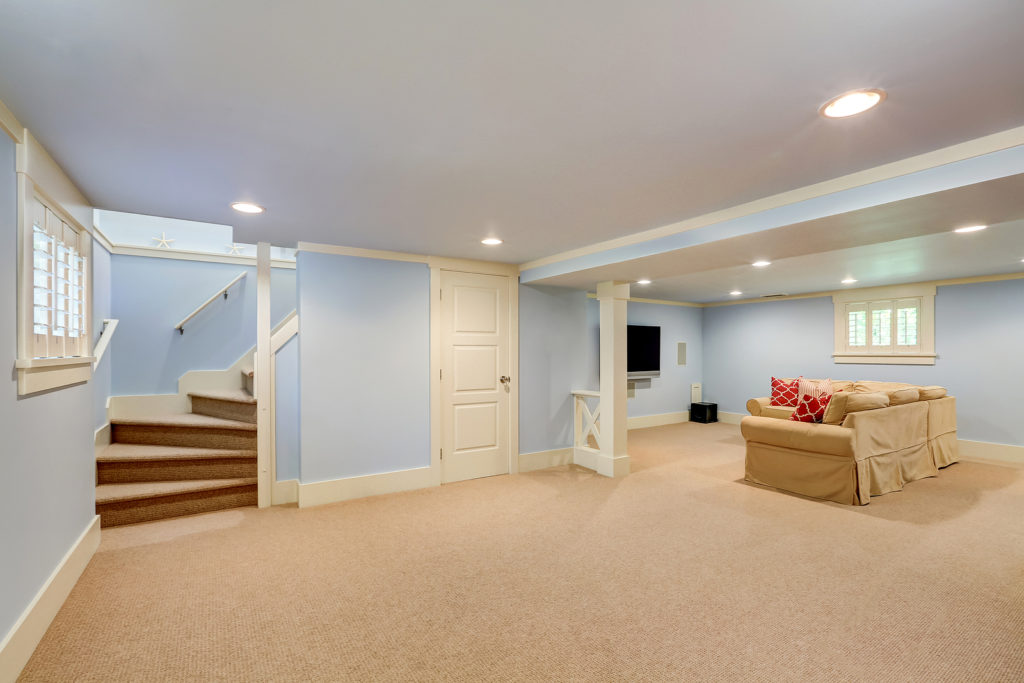When you are finishing or remodeling a basement, soundproofing between floors is an important factor in terms of comfort, satisfaction, and functionality. Continue reading to learn the common strategies and options for soundproofing your basement ceiling.

Best Basement Ceiling Soundproofing Options
Basement ceilings must be installed and modified adequately in order to cancel out noises from upstairs. You may think that special attention to basement ceilings is not necessary, but without it, your new-and-improved living space will be subjected to loud overhead noise like upstairs chit chatter, stomping feet, pets running around, people climbing stairs, doors opening and closing, and everything else that takes place in a busy home. It is in the best interest of your investment to properly insulate your basement ceilings, and not just for the sake of resale value, but for your personal enjoyment as well.
Here are the top solutions for soundproofing a basement ceiling:
? Canceling Overhead Noise
In order to cancel out overhead noise coming from the main level of the house, you must find a way to absorb the noise and interrupt the sound simultaneously. But first, you should know that you will most likely need to soundproof both the basement ceilings AND the main level floors for the best results. And if you desire a fully-soundproofed space, you will need to do the walls as well. Using floor padding, carpeting, areas rugs, and upholstered furniture on the main level can help with noise cancellation. Still, the most effective modification you can make to your basement is soundproofing the ceilings. And as mentioned above, you must find a strategy that absorbs sound and interrupts it at the same time.
? Absorbing and Interrupting Noise
In terms of noise absorption, installing a standard sound-dampening fiberglass insulation between the ceiling joists will usually get the job done, but this is somewhat considered to be the bare minimum for soundproofing a basement. Many contractors argue that the best option for absorbing upper-level noises in the basement is coupling fiberglass insulation with a denser, heavier material; such as soundproofing drywall, medium density fiberboard (MDF), or even heavy-duty vinyl sheeting.
In terms of noise interruption, you have a couple options. You can create a gap or you can insert a non-conductive (does not carry sound waves) barrier between the basement ceilings and the above floorboards. Both of these options essentially add another ceiling or floor between levels, which effectively inhibits noise vibrations from channeling through ceilings and joists. To determine your basement’s unique soundproofing needs, talk to a local and trusted general contractor that specializes in basement remodeling and drywall installation.
Methods for Soundproofing Ceilings:
✅ Add fiberglass installation.
✅ Install soundproofing drywall.
✅ Add a layer of acoustic drywall.
✅ Install fiberglass bats for exposed ceiling joists.
✅ Install fiberglass acoustic tiles.
✅ Add mass-loaded vinyl sheeting under drywall.
✅ Install sound clips to basement ceiling joists.
✅ Use sound isolation clips to attach drywall.
Your Leading Basement Remodeling Contractors in Indianapolis, Indiana
Call Restoration By L & B, LLC at 317-454-3612 for affordable basement remodeling in Indianapolis, Indiana and its surrounding areas. Our licensed general contractors provide a wide range of services for both commercial and residential properties, from general handyman services and restorations, to full-on renovations, additions, conversions, and more. Request an estimate, today!

